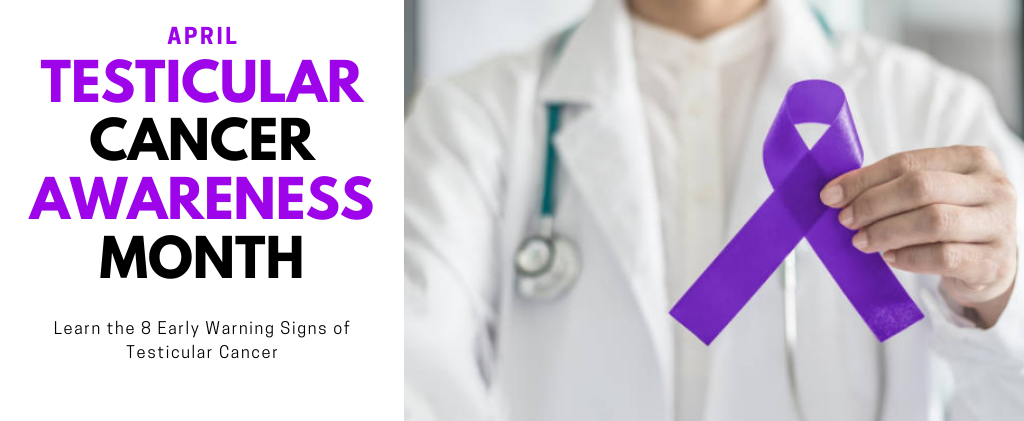
Testicular cancer is one of the most commonly diagnosed cancers in young adult men, particularly between ages 30 to 39. In honor of Testicular Cancer Awareness Month, we want to raise awareness about this common disease. It is important to learn the warning signs of testicular cancer, so you can detect it at an early stage, when more treatment options are available.
What is Testicular Cancer?
The testicles are two organs that are normally a little smaller than a golf ball in adult men and are contained within a sac of skin called the scrotum. Their main functions are to make sperm and male hormones.
Testicular cancer is a malignant growth or lump on the testicles. Testicular cancer is most common for males ages 15 to 35. When caught early, testicular cancer is highly treatable. People with testicular cancer may experience a variety of symptoms or signs. Sometimes, men with testicular cancer do not have any of these changes or the cause of a symptom may be a different medical condition that is not cancer. Having these symptoms does not mean that a man definitely has cancer.
Usually, an enlarged testicle or a small lump or area of hardness are the first signs of testicular cancer. Any lump, enlargement, hardness, pain, or tenderness should be evaluated by a doctor as soon as possible. Other symptoms of testicular cancer usually do not appear until after the cancer has spread to other parts of the body.
8 warning signs and symptoms of testicular cancer:
- A painless lump or swelling on either testicle. If found early, a testicular tumor may be about the size of a pea or a marble, but it can grow much larger.
- Pain, discomfort, or numbness in a testicle or the scrotum, with or without swelling.
- Change in the way a testicle feels or a feeling of heaviness in the scrotum.
- Dull ache in the lower abdomen or groin
- Sudden buildup of fluid in the scrotum
- Breast tenderness or growth. Although rare, some testicular tumors make hormones that cause breast tenderness or growth of breast tissue.
- Lower back pain, shortness of breath, chest pain, and bloody sputum or phlegm can be symptoms of later-stage testicular cancer.
- Swelling of 1 or both legs or shortness of breath from a blood clot can be symptoms of testicular cancer. For some young or middle-aged men, developing a blood clot may be the first sign of testicular cancer.
If you are concerned about any changes you experience, please talk with your doctor. Your doctor will ask how long and how often you’ve been experiencing the symptom(s), in addition to other questions in order to help figure out the cause of the problem.
If cancer is diagnosed, relieving symptoms remains an important part of cancer care and treatment. This may be called palliative care or supportive care. It is often started soon after diagnosis and continued throughout treatment.
Be sure to talk with your health care team about the symptoms you experience, including any new symptoms or a change in symptoms.
How is Testicular Cancer Treated?
Treatment options for testicular cancer include surgery, which often can include removing the testicle. Testicular biopsy of the mass is rarely done unless the patient only has one testicle. Patients can have a good quality of life and normal fertility with only one testicle. For more advanced cancers, that have spread to the lymph nodes, some patients may need further surgery, radiation therapy or chemotherapy. You may end up receiving more than one type of Diagnosis and treatment for Testicular Cancer. Depending on several factors, such as the grade of the tumor, where it is located, and whether it has spread to other parts of your body. Your doctors will decide which type or types of treatment is best for your personal condition.
Testicular Cancer Doctors in Santa Monica, CA
Our urologists are leaders in the field of multi-disciplinary approaches to diagnosing and treating testicular cancer. You can rest assured knowing that the Saint John’s Cancer Institute Saint John’s Health Center has experts in laparoscopic and robotic-assisted testicular cancer surgery should either of those procedures be required. Our team of experts are committed to discussing and explaining all options available to you, so you can be as informed as possible when making a decision on how to proceed. Meet our team of testicular cancer doctors.
Schedule an Appointment with our team of experts today!

